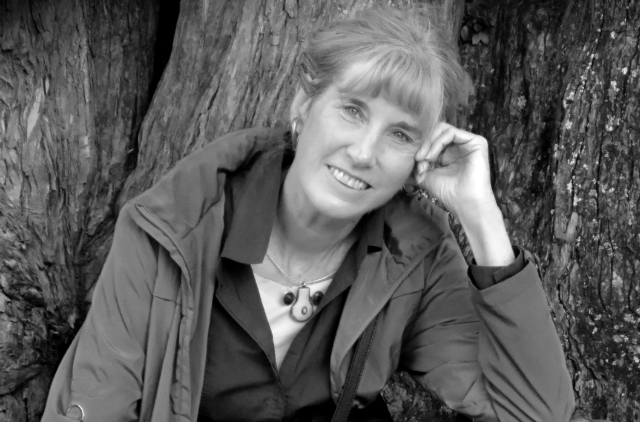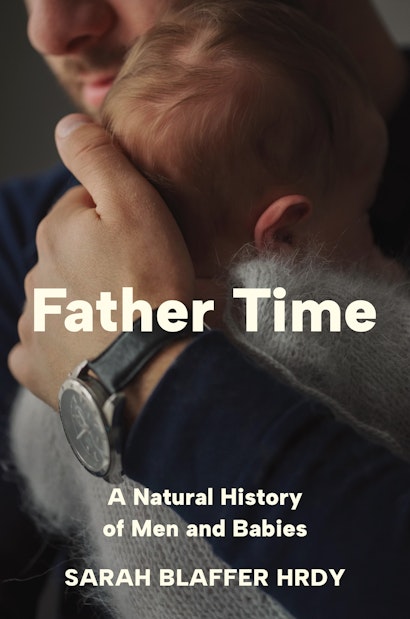It has long seemed self-evident that women care for babies and men do other things. Hasn’t it always been so? When evolutionary science came along, it rubber-stamped this venerable division of labor: mammalian males evolved to compete for status and mates, while females were purpose-built to gestate, suckle, and otherwise nurture the victors’ offspring. But come the twenty-first century, increasing numbers of men are tending babies, sometimes right from birth. How can this be happening? Puzzled and dazzled by the tender expertise of new fathers around the world—several in her own family—celebrated evolutionary anthropologist and primatologist Sarah Blaffer Hrdy set out to trace the deep history of male nurturing and explain a surprising departure from everything she had assumed to be “normal.”
What would you say was your book’s main message?
SH: As mother-centered as the study of baby care has always been, it is increasingly clear that men as well harbor extraordinarily caring proclivities, even when it comes to tending babies right from birth. The growing involvement in infant care by late 20th and early 21st century men is no longer too rare to notice. Nor is it either unnatural or emasculating. Rather it represents a boosting of a note in the biological chord of masculinity that has all too often been overlooked or suppressed, even while present all along. Under the right circumstances, males of our species are as well-equipped as women to tenderly nurture babies and develop caring priorities. Gestation, giving birth, and breast-feeding are not nature’s sole pathways to parental involvement and intense devotion.
What inspired you to write this book?
SH: Growing up in Texas in the middle of the last century, I had never so much as seen a man change a diaper, not ever. Nothing about either my upbringing or my later education at Harvard prepared me to imagine males of my own species becoming engrossed in the care of babies, some times right from birth. We are mammals, after all—members of a class of organisms where mothers are essential for suckling young. Furthermore, we descend from common ancestors with apes like chimpanzees, creatures among whom males are better known for savaging newborns than tending them. This is why I was so surprised to see more and more fathers engaged in infant care, both in the U.S and around the world—especially in other post-industrial, globalized economies where mothers are gainfully employed outside the home. Then in 2014, with the birth of my first grandchild, I had a ringside seat as my own son-in-law followed suit. Here was this manly fellow expertly and oh-so tenderly meeting his new baby’s every need, often providing 24/7 care. 2014 was also the year that social neuroscientists reported changes in the brains of fathers that were not only similar to those in mothers, but in the case of men serving as primary caretakers, virtually identical to them. Whatever was going on, it plainly was due to more than socioeconomic and cultural transformations or to technological innovations like baby bottles, breast pumps, and safe formula. How could this novel organism, man-the-nurturer, have come about?
Why were you so surprised by nurturing potential in human males?
SH: I have written whole books about maternal love and ambivalence, with the emphasis on the former. No one could be more aware than I that we humans are mammals among whom females invest heavily in gestating, birthing, and then suckling their young. Such processes hormonally prime mothers to respond to and passionately care for little creatures totally dependent on them. According to traditional evolutionary scripts, females care for babies, prioritizing their well-being while males mostly compete for status and mates so as to sire more of them. Such competition with other males leads men to what Darwin termed their remorseless “ambition which passes too easily into selfishness.” Over millions and millions of years, males have been “sexually selected” to seek power and status no matter the cost to those around them. For Darwin, this was simply “man’s natural and unfortunate birthright.” Given how overrepresented men are in daredevilry and acts of violence, why would anyone doubt this characterization? Like most good Darwinians, I certainly didn’t! Rather until recently, I subscribed to the widespread expectation that caring for babies is women’s work, while men do other things. But where did this blossoming male responsiveness to babies and potential for nurturing come from?
How did you go about finding an answer?
SH: The challenge was not so much explaining “why now.” Socioeconomic trends, ideological shifts, and technological innovations making men’s greater involvement with babies possible or even encouraged, are well documented by economists, sociologists, legal and other historians. For me, the big challenge was picking out the trail of male nurture across vertebrate, mammalian, and primate evolution, then tracing the shaping of hominin brains and emotions that over the course of the Pleistocene led to the emergence of Homo sapiens. As a sociobiologist as well as an anthropologist, I started from a comparative and evolutionary perspective. Chapter by chapter, I examined where else in nature do we find nurturing males? And under what conditions? Then I reexamined the increasingly rich and detailed primate literature to identify circumstances conducive to more direct male engagement in infant care. Next, I zeroed in on what paleontologists and behavioral ecologists have been learning about how the line of apes leading to the genus Homo managed to survive the climatic perturbations and recurring resource shortages that characterized the Pleistocene, a period when other species of bipedal apes all went extinct. Survival of our ancestors involved adopting what for an ape was an unusual mode of child-rearing with increased allomaternal responsiveness to babies on the part of female and male group members other than the mother. That done, I still needed to account for the existence of neural circuits in males that could render them as responsive to tiny babies as the mothers who birthed them. That required traveling even further back in evolutionary time, back hundreds of millions of years further than anthropologists ordinarily roam. Along the way, I also had to revise some of my deeply held biases about sex roles, especially about “man’s unfortunate natural birthright”. For men, it turns out, have a different birthright from the one that I and many of my evolutionary colleagues have so long assigned them.
Why does your book focus on infant care rather than child care more generally?
SH: From the outset I knew I would need to rely on evidence from other animals, but almost all of animal behavior’s best documented cases of paternal care involve males tending eggs, fry, tadpoles, and pups during particularly helpless and vulnerable life stages. Except for humans, there is just not that much known yet about male care of offspring at older ages. Already, though, the transformative power babies can wield over males is well documented.
Where did your title for the book come from?
Early in my career, back in the 1970s while still focused on infanticide, the antithesis of nurturing, I learned about a phenomenon called “sensitization.” Even in species of animals whose males ordinarily ignore, attack or cannibalize pups they encounter, males might, given the right circumstances, switch to gently tending them instead. What it took was repeated exposure. Time in intimate proximity somehow “flipped a switch” in the deepest recesses of the male brain, whether a rodent’s or a monkey’s. Time in intimate proximity to babies could have surprising effects on males including surges in oxytocin (known as a “bonding” hormone) or plummeting levels of testosterone which is why when writing Mother Nature (1999), I briefly fantasized about spraying “essence of newborn” around the bedroom of my teenage son. No wonder, that the title, Father Time, came to me almost before I decided to write the book when I was still a long way from understanding why time in intimate proximity to a baby could have the effect on males that it does.
So where do those nurturing impulses come from?
SH: In my quest to understand how protective and nurturing emotions in males arose and what it takes for them to be expressed, I had to take into account many millions of years of vertebrate, mammalian and particularly primate evolution, followed by hundreds of thousands of years of human evolution and thousands more of humankind’s rich and varied history. Ours has been a history punctuated by spectacular economic and societal transitions, environmental upheavals, cultural shifts, technological innovations, and impactful social movements. Over time, these set the stage for some males of our species to find themselves in prolonged intimate proximity to newborns. This is when long-latent neural circuits could at last be re-awakened—circuits that lingered on from a long-ago vertebrate past in watery worlds, back when (as Darwin once put it in private correspondence) “Our ancestor was an animal which breathed water, had a swim bladder, a great swimming tail… and undoubtedly was an hermaphrodite!” This would also have been when males were far more likely than females to be the parent who protected and tended immature life forms.
Even now, this answer seems so improbable and surprising that I still wake up at night and worry, “Can this possibly be right?” But nothing else fits the evidence quite so well. Evidently, Darwin himself had once considered the possibility of a “maternal instinct” lying latent in males. But, lacking corroboration from twenty-first-century neuroscience, he set aside what is perhaps the most prescient of all that great naturalist’s intuitive leaps, the idea that “the secondary characteristics of each sex lie dormant or latent in the opposite sex, ready to be evolved under peculiar circumstances.” Now, in light of new findings from comparative neuroscientists like Catherine Dulac, Kumi Kuroda, Michael Numan, Lauren O’Connell, and Larry Young along with novel interpretations from evolution and development-minded paleontologists like Sean Carroll and Neil Shubin, and evolutionary theorists like Mary Jane West-Eberhard, I have become convinced that Darwin’s initial, but long ago discarded, musings were right after all.
Sarah Blaffer Hrdy is professor emerita of anthropology at the University of California, Davis. She is the author of The Woman That Never Evolved, Mother Nature, and Mothers and Others: The Evolutionary Origins of Mutual Understanding.

